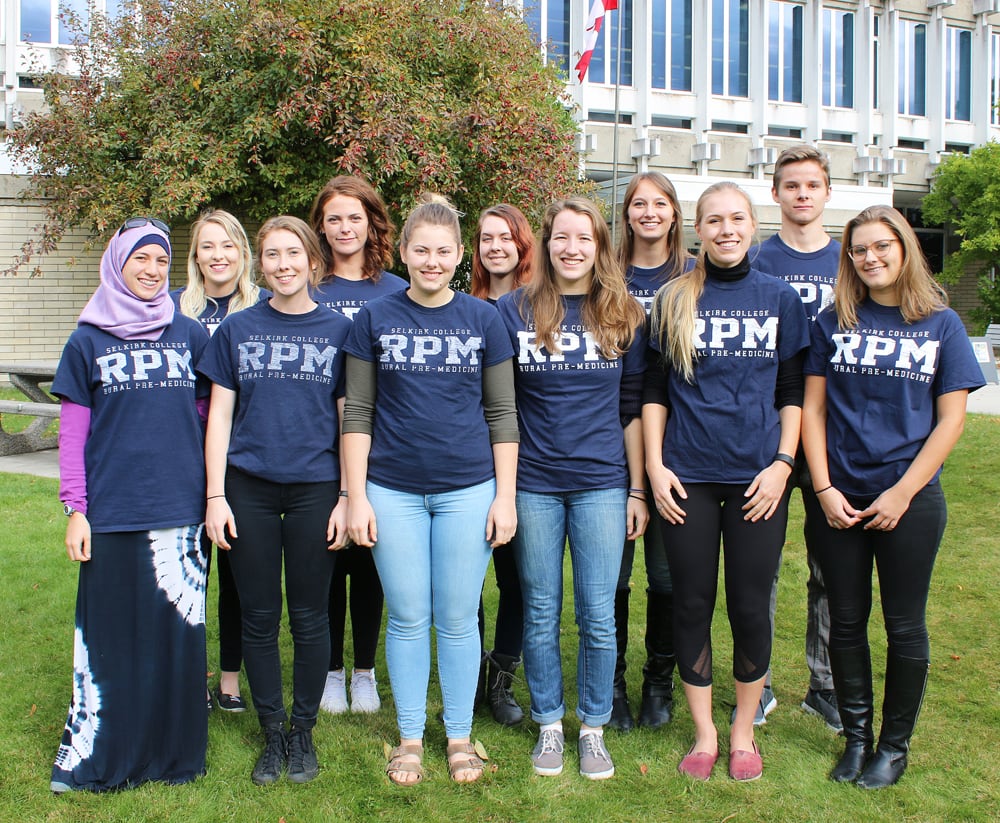Rural Pre-Med Scholarships Awarded
A dozen Selkirk College students focused on the future of health care in rural British Columbia have received financial support from the medical community they hope to join one day.
Selkirk College’s Rural Pre-Medicine (RPM) Program recently welcomed its fourth cohort of students who are starting their post-secondary journey in the intensive three-year program that aims to prepare learners for medical school and other health care pathways.
Since it began in 2014, the RPM Program has received significant support from physicians who share the common goal of recruiting and retaining doctors in rural British Columbia. As part of its support, the Joint Standing Committee on Rural Issues and the Kootenay Boundary Division of Family Practice have provided a total of $32,000 in scholarships to 12 students.
“It’s allowed me to focus on my education more because I don’t have to worry as much about financial pressures,” says Hannah Montgomery, one of five students to receive a $5,000 Joint Standing Committee on Rural Issues scholarship. “It means a lot that there are people willing to provide the money for these scholarships because they believe in us and what we are going to do in our futures.”
The Joint Standing Committee on Rural Issues is a partnership between Doctors of BC and the provincial government. The goals of the committee are to enhance the availability and stability of services provided by physicians in rural and remote areas of British Columbia by addressing some of the uniquely demanding and difficult circumstances that exist.
Based on their academic performance in the first and second year of studies, and their potential for success, the Joint Standing Committee on Rural Issues scholarship also provided $5,000 awards to Molly Benbow, Zakeea Al-Hanafy, Lucille Webber and Svetlana Hadikin.
“One of the major barriers that prevents rural students from pursuing medicine as a career is funding,” says Elizabeth Lund, the RPM Program Coordinator. “Typically, rural students are from families with lower average incomes than urban students, they usually have to move away from home to attend university and they incur much higher costs than urban students in order to access the crucial non-academic activities which are necessary for success in applying to medical school.”
The Kootenay Boundary Division of Family Practice represents family physicians in the region with the goal of improving patient access to local primary care, increase local physicians’ influence on health care delivery and policy, and provide professional support. Individual doctors make contributions to the fund and are matched by the organization. Students who receive the $1,000 scholarships must have graduated from a Kootenay Boundary high school.
“It’s extremely important for students because obviously it helps us pursue our post-secondary education,” says 18-year-old Samuel Keefer, a first year RPM student. “But investing in such an important area as rural medicine is also beneficial for the community since the goal here is to help to increase the number of doctors that come back to the rural communities. It’s an investment in the future.”
Also receiving the Kootenay Boundary Division of Family Practice award are Jocelyn Terwoord (Salmo), Madia Rehwald (Crescent Valley), Madison Morehouse (Rossland), Andi Belland (Nelson), Samuel Zerrath (Edgewood) and Allie Zondervan (Nelson).
Supporting students in their academic journey is something Lund says is vital to the success of the program.
“These scholarships were established as seed funding in hopes that we can continue to have others come on board to build and help support our students,” says Lund. “One of the goals of the program is to work towards ensuring each RPM student who is in need is fully funded and able to compete with their urban counterparts in applying to med school.”
The post-secondary journey to becoming a physician is a long road, but with financial support students in the RPM Program are ready for the challenges that await.
“Medicine is the cutting edge of science, it’s really the bridge between science and the people,” says Keefer. “It’s the bridge between patients and all this massive knowledge. So I think eight years is a pretty small price to pay to be the person to bring this to the community. Eight years is a huge number, but when you compare it to what an amazing career this would be… it’s really worth the time you spend in school.”
If you would like to contribute to scholarships and bursaries in support of Rural Pre-Medicine Program students please contact Selkirk College Advancement Coordinator Stephanie Gobin at 250.505.1309.
Find out more about the Selkirk College Rural Pre-Medicine Program at: selkirk.ca/rural-pre-medicine.


























Comments